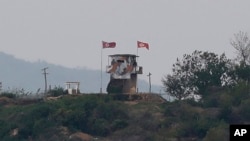A day after blowing up the de facto inter-Korean embassy, North Korea continued to ratchet up military pressure on the South, announcing the re-deployment of its forces near the border and angrily rejecting Seoul’s offer to send envoys to reduce tensions.
As of Wednesday, North Korea’s military will reenter the area near the Mt. Kumgang resort area and the Kaesong industrial complex, according to a spokesperson for the Korean People’s Army in the state-run Korean Central News Agency (KCNA).
In addition, guard posts that had previously been abandoned “will be set up again to strengthen the guard over the front line,” and North Korea will also resume “all kinds of regular military exercises” in the area near the country’s sea border with South Korea, KCNA reported.
Combined with its moves over the past week, North Korea has now reversed many of the achievements made during a series of historic 2018 meetings between North Korean leader Kim Jong Un and South Korean President Moon Jae-in.
On Tuesday, North Korea used controlled explosives to demolish the inter-Korean liaison center just north of the border. Last week, Pyongyang said it would cut off all official channels of dialogue with Seoul.
North Korea is ostensibly angry at the South for not doing more to stop defectors and other activists from floating anti-Pyongyang leaflets and other materials across the border. But in reality, the North’s anger appears to be a staged provocation cycle, possibly meant to unify domestic public opinion and force concessions from South Korea and the United States.
In an unsigned KCNA commentary Wednesday, North Korea described the liaison office destruction as a "first stage step,” saying further action will depend on South Korea's response.
But in a corresponding statement, senior North Korean leader Kim Jong Un rejected South Korea’s offer to send envoys. Kim called the offer "unrealistic," "tactless," "absurd," "sinister," "a petty farce," "reckless," "preposterous," and "disrespectful."
Another KCNA commentary hinted North Korea could soon resume its threats to set Seoul “on fire,” a warning Pyongyang has repeatedly made during past cycles of provocation.
South Korea pushes back
On Wednesday, a South Korean presidential spokesperson called Kim Jong Un’s remarks “absurd.”
"This is fundamentally undermining the trust that has been built between the leaders, and we warn that we will not tolerate their unreasonable words and actions,” said the spokesperson.
South Korea's Blue House also expressed outrage that North Korea publicly disclosed Seoul's private offer to send envoys.
"Unprecedented nonsense," said a South Korean official, adding he hoped the North would show “basic courtesy” in the future.
South Korea’s Ministry of National Defense also warned North Korea will “definitely pay for its behavior” if it conducts any military provocation.
Past provocations
North Korea has a long history of deadly military provocations against the South.
In March 2010, a North Korean torpedo sank a South Korean warship off Korea’s west coast, killing 46 sailors. A few months later, the North shelled the border island of Yeonpyeong, killing several more people.
Tuesday’s liaison office destruction falls far short of those steps, says Duyeon Kim, a senior adviser for Northeast Asia and nuclear policy at the International Crisis Group.
“It’s technically not an attack on South Korea nor an act that would invite a military response from Seoul,” she says. “We can expect Pyongyang will continue with similar military acts but not enough that would force Seoul to retaliate in kind with force.”
Though the destruction of the liaison office is a slap in the face to Seoul, the move was primarily symbolic, since the office had been nonfunctional for months. South Korean staff left the facility in late January due to coronavirus concerns.
"Blowing up the North-South Liaison Office conveys Kim Jong Un’s graphic rejection of President Moon’s attempts at rapprochement,” says Daniel Russel, a former top U.S. diplomat for East Asia.
“It is also a reminder to the United States that North Korea cannot be ignored. Ramping up pressure through escalating provocations is how Kim makes the point that without sanctions relief, sooner or later he will also blow up Trump’s claim to have ‘ended the threat’ from North Korea,” said Russel who is now at the Asia Society Policy Institute.
Trump and Kim have met three times, including in June 2018 where they agreed to work toward the denuclearization of the Korean Peninsula. But those talks have been mostly stalled since last year over disagreements on how to pace sanctions relief with steps to dismantle North Korea’s nuclear program.
Some analysts say North Korea’s provocations against the South are intended to indirectly pressure the United States. But so far there are few signs Trump is interested in prioritizing the issue ahead of his presidential election in November.




